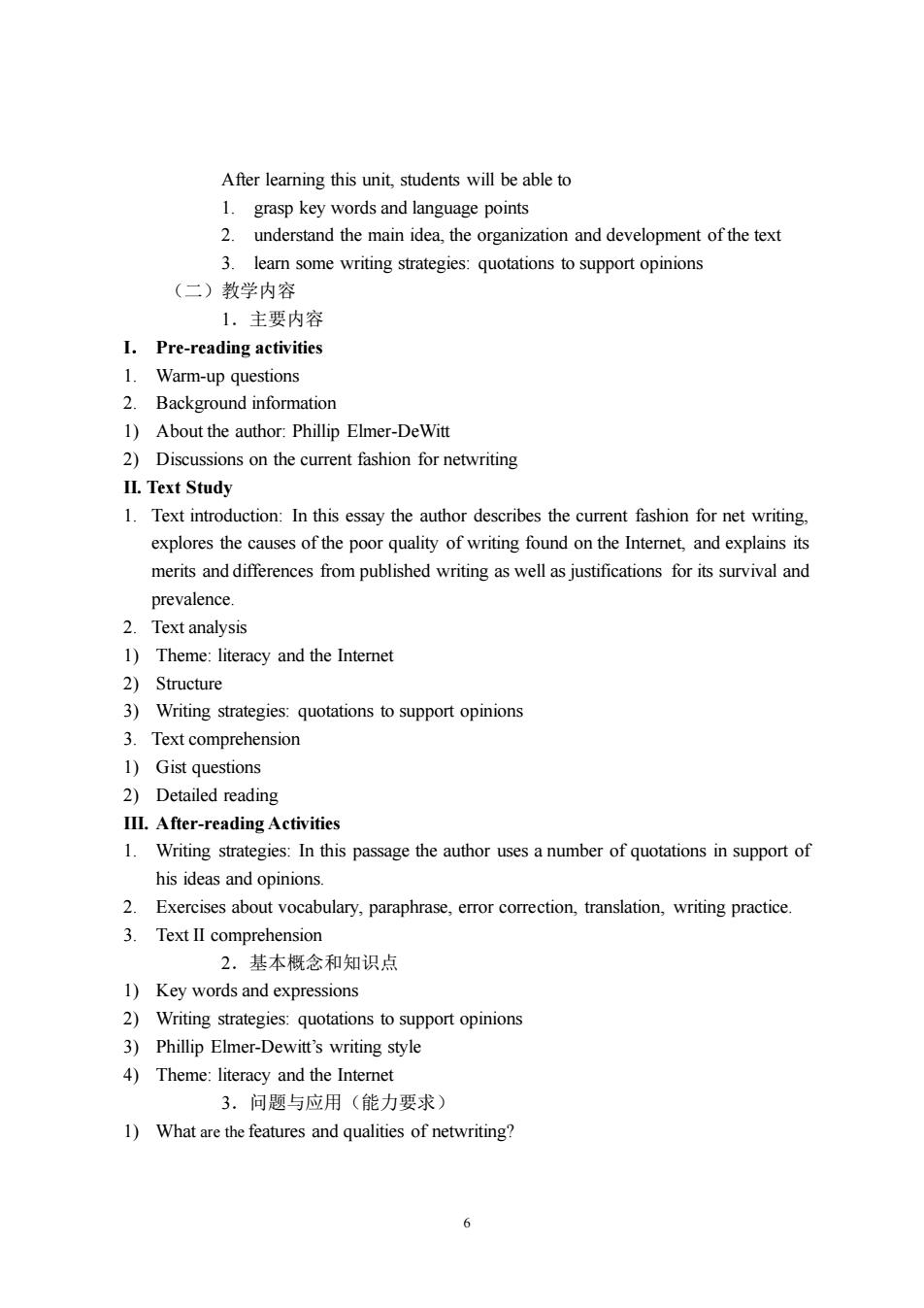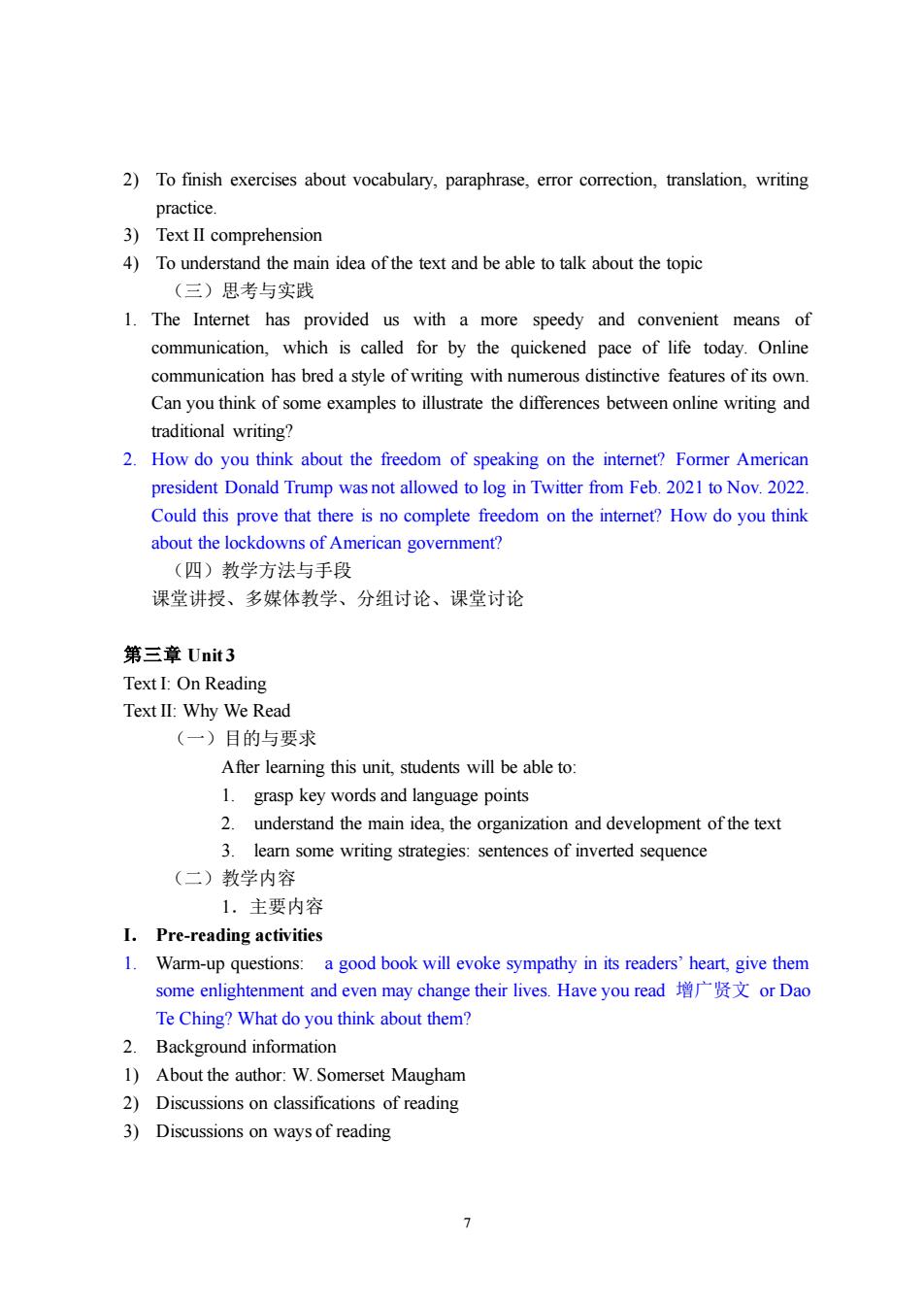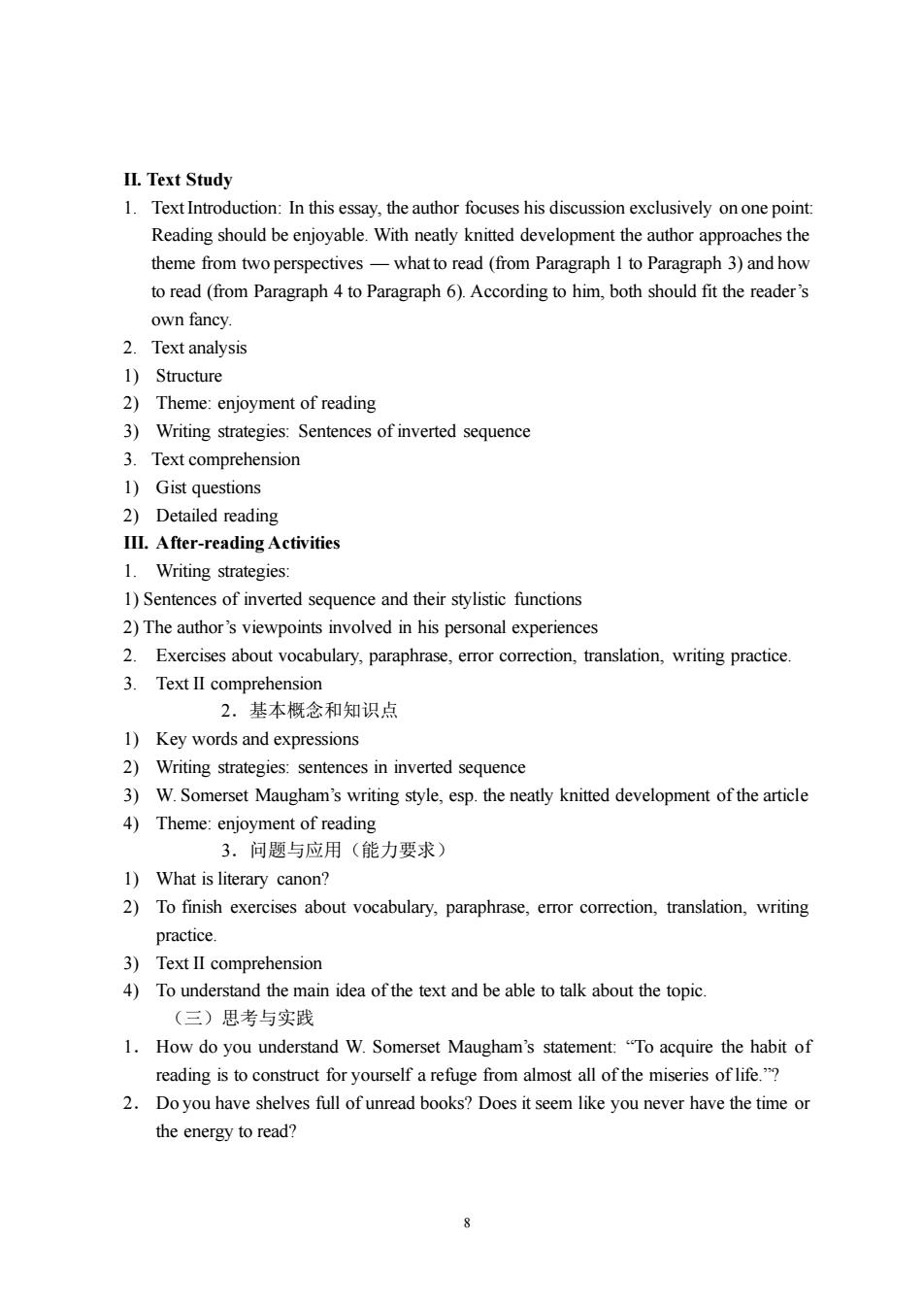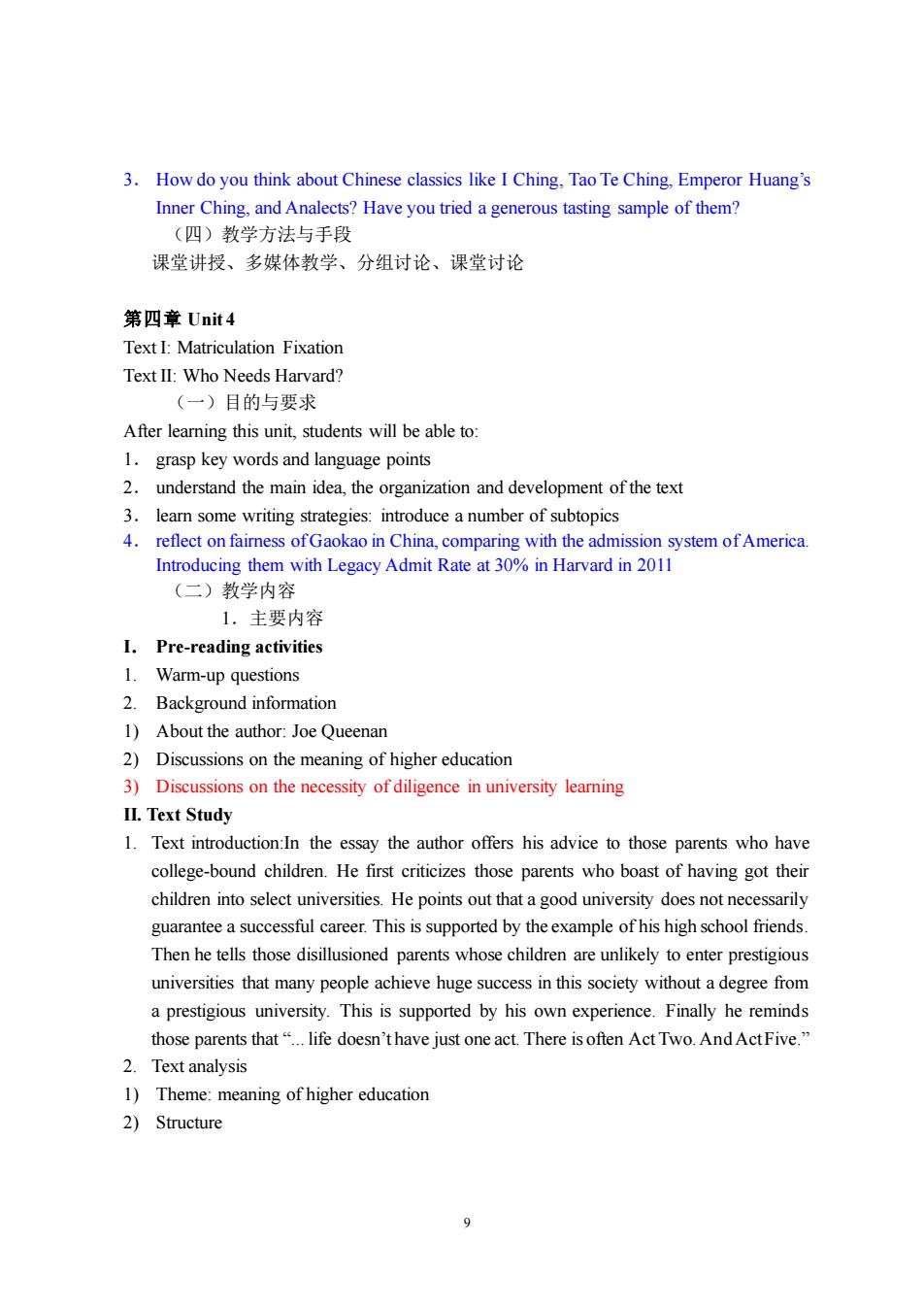
After leamning this unit,students will be able to 1.grasp key words and language points 2.understand the main idea,the organization and development of the text 3.leamn some writing strategies:quotations to support opinions (二)教学内容 1.主要内容 I.Pre-reading activities 1.Warm-up questions 2.Background information 1)About the author:Phillip Elmer-DeWitt 2)Discussions on the current fashion for netwriting II.Text Study 1.Text introduction:In this essay the author describes the current fashion for net writing. explores the causes of the poor quality of writing found on the Internet,and explains its merits and differences from published writing as well as justifications for its survival and prevalence. 2.Text analysis 1)Theme:literacy and the Internet 2)Structure 3)Writing strategies:quotations to support opinions 3.Text comprehension 1)Gist questions 2)Detailed reading III.After-reading Activities Writing strategies:In this passage the author uses a number of quotations in support of his ideas and opinions. 2.Exercises about vocabulary,paraphrase,error correction,translation,writing practice. 3.Text II comprehension 2.基本概念和知识点 1)Key words and expressions 2)Writing strategies:quotations to support opinions 3)Phillip Elmer-Dewitt's writing style 4)Theme:literacy and the Internet 3.问题与应用(能力要求》 1)What are the features and qualities of netwriting? 6
6 After learning this unit, students will be able to 1. grasp key words and language points 2. understand the main idea, the organization and development of the text 3. learn some writing strategies: quotations to support opinions (二)教学内容 1.主要内容 I. Pre-reading activities 1. Warm-up questions 2. Background information 1) About the author: Phillip Elmer-DeWitt 2) Discussions on the current fashion for netwriting II. Text Study 1. Text introduction: In this essay the author describes the current fashion for net writing, explores the causes of the poor quality of writing found on the Internet, and explains its merits and differences from published writing as well as justifications for its survival and prevalence. 2. Text analysis 1) Theme: literacy and the Internet 2) Structure 3) Writing strategies: quotations to support opinions 3. Text comprehension 1) Gist questions 2) Detailed reading III. After-reading Activities 1. Writing strategies: In this passage the author uses a number of quotations in support of his ideas and opinions. 2. Exercises about vocabulary, paraphrase, error correction, translation, writing practice. 3. Text II comprehension 2.基本概念和知识点 1) Key words and expressions 2) Writing strategies: quotations to support opinions 3) Phillip Elmer-Dewitt’s writing style 4) Theme: literacy and the Internet 3.问题与应用(能力要求) 1) What are the features and qualities of netwriting?

2)To finish exercises about vocabulary,paraphrase,error correction,translation,writing practice 3)Text II comprehension 4)To understand the main idea of the text and be able to talk about the topic (三)思考与实践 1.The Internet has provided us with a more speedy and convenient means of communication,which is called for by the quickened pace of life today.Online communication has bred a style of writing with numerous distinctive features of its own. Can you think of some examples to illustrate the differences between online writing and traditional writing? 2.How do you think about the freedom of speaking on the internet?Former American president Donald Trump was not allowed to log in Twitter from Feb.2021 to Nov.2022. Could this prove that there is no complete freedom on the interet?How do you think about the lockdowns of American government? (四)教学方法与手段 课堂讲授、多媒体教学、分组讨论、课堂讨论 第三章Unit3 Text I:On Reading Text II:Why We Read (一)目的与要求 After leamning this unit,students will be able to: 1 grasp key words and language points 2.understand the main idea,the organization and development of the text 3 leam some writing strategies:sentences of inverted sequence (二)教学内容 1.主要内容 I.Pre-reading activities 1.Warm-up questions:a good book will evoke sympathy in its readers'heart,give them some enlightenment and even may change their lives.Have you read增广贤文or Dao Te Ching?What do you think about them? 2 Background information 1)About the author:W.Somerset Maugham 2)Discussions on classifications of reading 3)Discussions on ways of reading 7
7 2) To finish exercises about vocabulary, paraphrase, error correction, translation, writing practice. 3) Text II comprehension 4) To understand the main idea of the text and be able to talk about the topic (三)思考与实践 1. The Internet has provided us with a more speedy and convenient means of communication, which is called for by the quickened pace of life today. Online communication has bred a style of writing with numerous distinctive features of its own. Can you think of some examples to illustrate the differences between online writing and traditional writing? 2. How do you think about the freedom of speaking on the internet? Former American president Donald Trump was not allowed to log in Twitter from Feb. 2021 to Nov. 2022. Could this prove that there is no complete freedom on the internet? How do you think about the lockdowns of American government? (四)教学方法与手段 课堂讲授、多媒体教学、分组讨论、课堂讨论 第三章 Unit 3 Text I: On Reading Text II: Why We Read (一)目的与要求 After learning this unit, students will be able to: 1. grasp key words and language points 2. understand the main idea, the organization and development of the text 3. learn some writing strategies: sentences of inverted sequence (二)教学内容 1.主要内容 I. Pre-reading activities 1. Warm-up questions: a good book will evoke sympathy in its readers’ heart, give them some enlightenment and even may change their lives. Have you read 增广贤文 or Dao Te Ching? What do you think about them? 2. Background information 1) About the author: W. Somerset Maugham 2) Discussions on classifications of reading 3) Discussions on ways of reading

II.Text Study 1.Text Introduction:In this essay,the author focuses his discussion exclusively on one point Reading should be enjoyable.With neatly knitted development the author approaches the theme from two perspectives-what to read(from Paragraph I to Paragraph 3)and how to read(from Paragraph 4 to Paragraph 6).According to him,both should fit the reader's own fancy. 2.Text analysis 1)Structure 2)Theme:enjoyment of reading 3)Writing strategies:Sentences of inverted sequence 3.Textcomprehension 1)Gist questions 2)Detailed reading III.After-reading Activities 1.Writing strategies: 1)Sentences of inverted sequence and their stylistic functions 2)The author's viewpoints involved in his personal experiences 2.Exercises about vocabulary,paraphrase,error correction,translation,writing practice. 3.Text II comprehension 2.基本概念和知识点 1)Key words and expressions 2)Writing strategies:sentences in inverted sequence 3)W.Somerset Maugham's writing style,esp.the neatly knitted development of the article 4)Theme:enjoyment of reading 3.问题与应用(能力要求 1)What is literary canon? 2)To finish exercises about vocabulary,paraphrase,error correction,translation,writing practice 3)Text II comprehension 4)To understand the main idea of the text and be able to talk about the topic (三)思考与实践 1.How do you understand W.Somerset Maugham's statement:"To acquire the habit of reading is to construct for yourself a refuge from almost all of the miseries of life."? 2.Do you have shelves full of unread books?Does it seem like you never have the time or the energy to read? 8
8 II. Text Study 1. Text Introduction: In this essay, the author focuses his discussion exclusively on one point: Reading should be enjoyable. With neatly knitted development the author approaches the theme from two perspectives — what to read (from Paragraph 1 to Paragraph 3) and how to read (from Paragraph 4 to Paragraph 6). According to him, both should fit the reader’s own fancy. 2. Text analysis 1) Structure 2) Theme: enjoyment of reading 3) Writing strategies: Sentences of inverted sequence 3. Text comprehension 1) Gist questions 2) Detailed reading III. After-reading Activities 1. Writing strategies: 1) Sentences of inverted sequence and their stylistic functions 2) The author’s viewpoints involved in his personal experiences 2. Exercises about vocabulary, paraphrase, error correction, translation, writing practice. 3. Text II comprehension 2.基本概念和知识点 1) Key words and expressions 2) Writing strategies: sentences in inverted sequence 3) W. Somerset Maugham’s writing style, esp. the neatly knitted development of the article 4) Theme: enjoyment of reading 3.问题与应用(能力要求) 1) What is literary canon? 2) To finish exercises about vocabulary, paraphrase, error correction, translation, writing practice. 3) Text II comprehension 4) To understand the main idea of the text and be able to talk about the topic. (三)思考与实践 1. How do you understand W. Somerset Maugham’s statement: “To acquire the habit of reading is to construct for yourself a refuge from almost all of the miseries of life.”? 2. Do you have shelves full of unread books? Does it seem like you never have the time or the energy to read?

3.How do you think about Chinese classics like I Ching,Tao Te Ching.Emperor Huang's Inner Ching,and Analects?Have you tried a generous tasting sample of them? (四)教学方法与手段 课堂讲授、多媒体教学、分组讨论、课堂讨论 第四章Unit4 Text I:Matriculation Fixation Text II:Who Needs Harvard? (一)目的与要求 After learning this unit,students will be able to: 1.grasp key words and language points 2. understand the main idea,the organization and development of the text 3.learn some writing strategies:introduce a number of subtopics 4. reflect on faimess ofGaokao in China,comparing with the admission system of America Introducing them with Legacy Admit Rate at 30%in Harvard in 2011 (二)教学内容 1.主要内容 I.Pre-reading activities 1.Warm-up questions 2.Background information 1)About the author:Joe Queenan 2)Discussions on the meaning of higher education 3)Discussions on the necessity of diligence in university learning II.Text Study 1.Text introduction:In the essay the author offers his advice to those parents who have college-bound children.He first criticizes those parents who boast of having got their children into select universities.He points out that a good university does not necessarily guarantee a successful career.This is supported by the example ofhis high school friends. Then he tells those disillusioned parents whose children are unlikely to enter prestigious universities that many people achieve huge success in this society without a degree from a prestigious university.This is supported by his own experience.Finally he reminds those parents that"life doesn'thave just one act.There is often Act Two.And ActFive." 2.Text analysis 1)Theme:meaning of higher education 2)Structure
9 3. How do you think about Chinese classics like I Ching, Tao Te Ching, Emperor Huang’s Inner Ching, and Analects? Have you tried a generous tasting sample of them? (四)教学方法与手段 课堂讲授、多媒体教学、分组讨论、课堂讨论 第四章 Unit 4 Text I: Matriculation Fixation Text II: Who Needs Harvard? (一)目的与要求 After learning this unit, students will be able to: 1. grasp key words and language points 2. understand the main idea, the organization and development of the text 3. learn some writing strategies: introduce a number of subtopics 4. reflect on fairness of Gaokao in China, comparing with the admission system of America. Introducing them with Legacy Admit Rate at 30% in Harvard in 2011 (二)教学内容 1.主要内容 I. Pre-reading activities 1. Warm-up questions 2. Background information 1) About the author: Joe Queenan 2) Discussions on the meaning of higher education 3) Discussions on the necessity of diligence in university learning II. Text Study 1. Text introduction:In the essay the author offers his advice to those parents who have college-bound children. He first criticizes those parents who boast of having got their children into select universities. He points out that a good university does not necessarily guarantee a successful career. This is supported by the example of his high school friends. Then he tells those disillusioned parents whose children are unlikely to enter prestigious universities that many people achieve huge success in this society without a degree from a prestigious university. This is supported by his own experience. Finally he reminds those parents that “... life doesn’t have just one act. There is often Act Two. And Act Five.” 2. Text analysis 1) Theme: meaning of higher education 2) Structure

3)Writing strategies:introduce a number of subtopics 3.Text comprehension 1)Gist questions 2)Detailed reading III.After-reading Activities 1.Writing strategies:Written in a personal and informal style,this essay has a number of subtopics that are carefully introduced.The essay begins with the author's unexpected encounter with a stranger in a hospital.and ends with his tour of MIT campus 2.Exercises about vocabulary,paraphrase,error correction,translation,writing practice. 3.Text II comprehension The article presents a look at the pressure on high school students to be admitted to prestigious colleges and universities in the U.S.and misconceptions about the benefits of elite schools.The author offers a look at a study which revealed that students,not schools,are responsible for financial and professional success.To conclude that it is the student himself not the university decides how excellent he will be in future. 2.基本概念和知识点 1)Key words and expressions 2)Writing strategies:how to use an anecdote as a starting point of the essay how to echo subtopics to a theme of an essay 3)Joe Queenan's writing style,esp.a personal and informal style 4) Theme:people's obsessive interest in attending elite colleges 3.问题与应用(能力要求) 1)What is the meaning ofhigher education 2)To finish exercises about vocabulary,paraphrase,error correction,translation,writing practice 3)Text lI comprehension 4)To understand the main idea of the text and be able to talk about the topic (三)思若与实 1.Do elite colleges really matter? 2.How do universities influence your life? 3.What's the merit of your college? 4.What's your advice for your college? (四)教学方法与手段 课堂讲授、多媒体教学、分组讨论、课堂讨论 10
10 3) Writing strategies: introduce a number of subtopics 3. Text comprehension 1) Gist questions 2) Detailed reading III. After-reading Activities 1. Writing strategies: Written in a personal and informal style, this essay has a number of subtopics that are carefully introduced. The essay begins with the author’s unexpected encounter with a stranger in a hospital, and ends with his tour of MIT campus. 2. Exercises about vocabulary, paraphrase, error correction, translation, writing practice. 3. Text II comprehension The article presents a look at the pressure on high school students to be admitted to prestigious colleges and universities in the U.S. and misconceptions about the benefits of elite schools. The author offers a look at a study which revealed that students, not schools, are responsible for financial and professional success. To conclude that it is the student himself not the university decides how excellent he will be in future. 2.基本概念和知识点 1) Key words and expressions 2) Writing strategies: how to use an anecdote as a starting point of the essay & how to echo subtopics to a theme of an essay 3) Joe Queenan’s writing style, esp. a personal and informal style 4) Theme: people’s obsessive interest in attending elite colleges 3.问题与应用(能力要求) 1) What is the meaning of higher education? 2) To finish exercises about vocabulary, paraphrase, error correction, translation, writing practice. 3) Text II comprehension 4) To understand the main idea of the text and be able to talk about the topic (三)思考与实践 1. Do elite colleges really matter? 2. How do universities influence your life? 3. What’s the merit of your college? 4. What’s your advice for your college? (四)教学方法与手段 课堂讲授、多媒体教学、分组讨论、课堂讨论